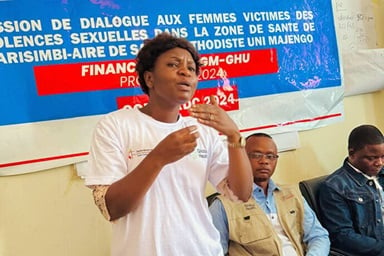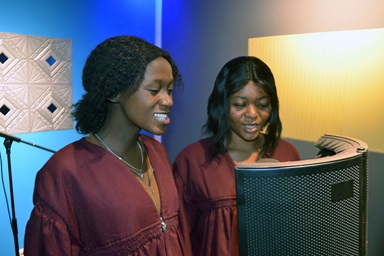Doctors in Kabongo often had to perform surgeries, deliver babies and care for sick children and emergency patients by candlelight.
Due to the lack of power, some avoided United Methodist Kabongo Hospital for treatment, especially at night.
That all changed with the addition of a solar panel station that will provide reliable power to the hospital.
Earlier this year, Dr. Joseph Kayembe Katongola created a solar panel station using 14 panels that had been installed throughout the hospital in 2014. Individually, the panels weren’t providing the needed power.
Katongola said the solar system will improve working conditions and quality of life for patients and staff.
“No matter what different medical personnel we have — internists, pediatricians, nurses — in Kabongo Hospital, we need to offer medical care of quality to improve our workplace and love what we do,” he said.
Justine Kyungu wa Ngoy, a pediatric nurse, said having permanent power solves some major challenges at the hospital.
“It has been a problem when women come at night for baby delivery, malaria cases with children or surgery at night with limited energy,” she said.
Subscribe to our
e-newsletter
Like what you're reading and want to see more? Sign up for our free daily and weekly digests of important news and events in the life of The United Methodist Church.
Part of the $48,000 grant issued by Global Ministries is being used to rehabilitate the hospital.
By improving the hospital’s working conditions and environment, the hospital is generating more income, said Katongola. He said that helps motivate staff by providing regular paychecks.
Dr. Patrick Kilunji, who works at Shungu Clinic in Kamina and did his internship at Kabongo Hospital, said it was difficult to work with limited energy. Some electrical equipment had been in storage for months because the hospital lacked the power to use it.
“Now, as the hospital is lightened, the work needs to be improved and maintenance should be a priority, so that energy becomes permanent. Electrical equipment like incubators and ultrasounds now will be operational,” he said.
Laboratories also will be in use 24 hours a day, said Gracia Kalenga Ngoy, a nurse at the hospital.
While the hospital has a generator, it couldn’t be used every day because of the cost of fuel.
“Fuel is Kabongo is a big challenge. … The small quantity found is expensive,” said Marianne Ilunga, a midwife at the hospital.
She said now the generator is used only when the solar panels are not fully charged.
Ilunga said the system also provides light for the surrounding houses, including a United Methodist guesthouse that is located near the hospital.
The addition of power at night has brought more patients to the hospital.
“Energy attracts patients for security, especially at night,” she said.
Dr. Alexis Mgoy Kasole, medical coordinator, agreed. He said energy at the hospital improves conditions and creates trust and confidence between the community and medical staff.
Although many of the personnel are hired by the church, the condition of the facility and the care is what brings patients to the hospital, he said.
“The more that work conditions improve, the easier (it will be for) community members to trust and come for care to the hospital on a daily basis,” he said.
Having the solar system at Kabongo Hospital also has created change outside the hospital, Kasole said. It has inspired business owners in the area to install their own solar panels.
“Private solar houses help to run small businesses by creating phone charging stations, running public television shows as entertainment in the community, radio operation systems and computer service where people come to use computers and do printing,” he said.
Musau is the director of communication in the North Katanga Conference.
News media contact: Vicki Brown, Nashville, Tennessee, (615) 742-5470 or [email protected]. To read more United Methodist news, subscribe to the free Daily or Weekly Digests.
Like what you're reading? Support the ministry of UM News! Your support ensures the latest denominational news, dynamic stories and informative articles will continue to connect our global community. Make a tax-deductible donation at ResourceUMC.org/GiveUMCom.




